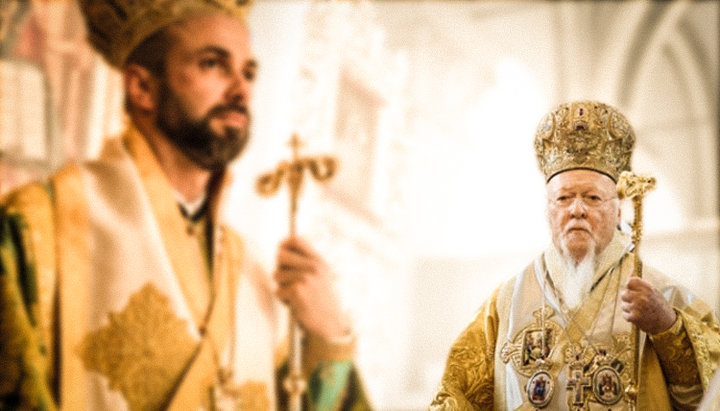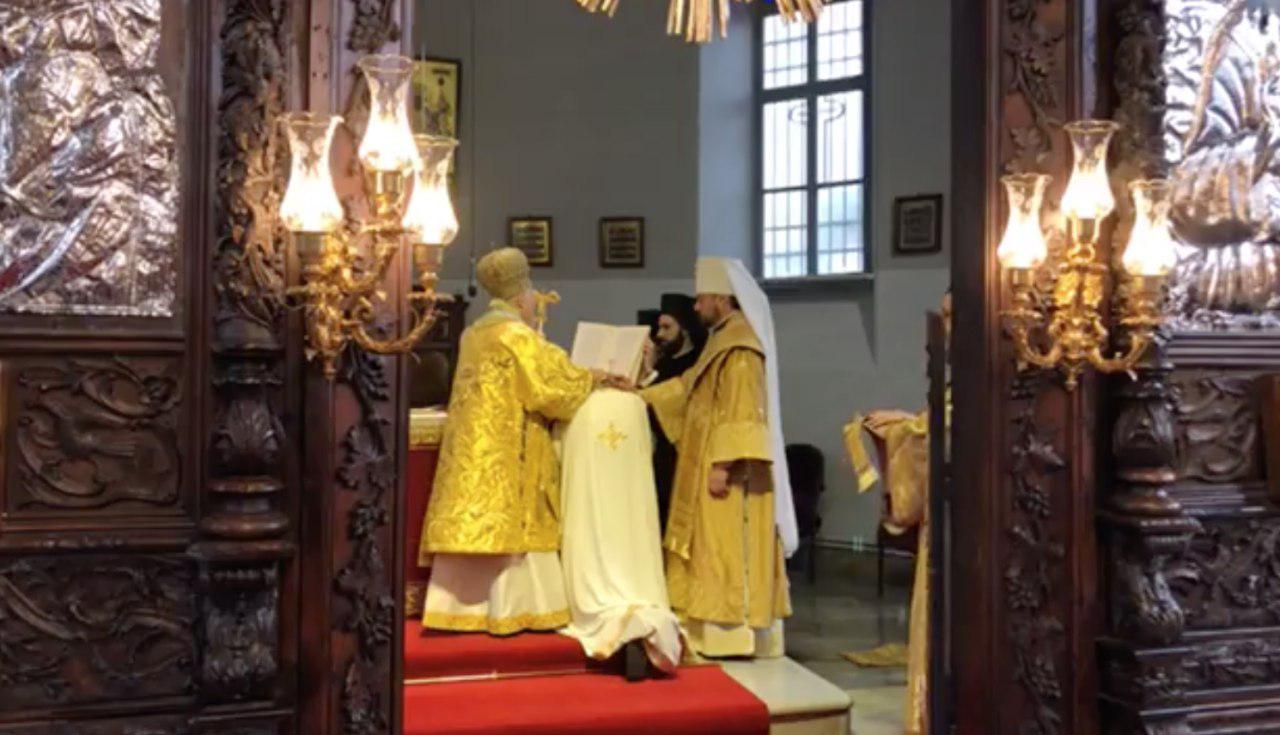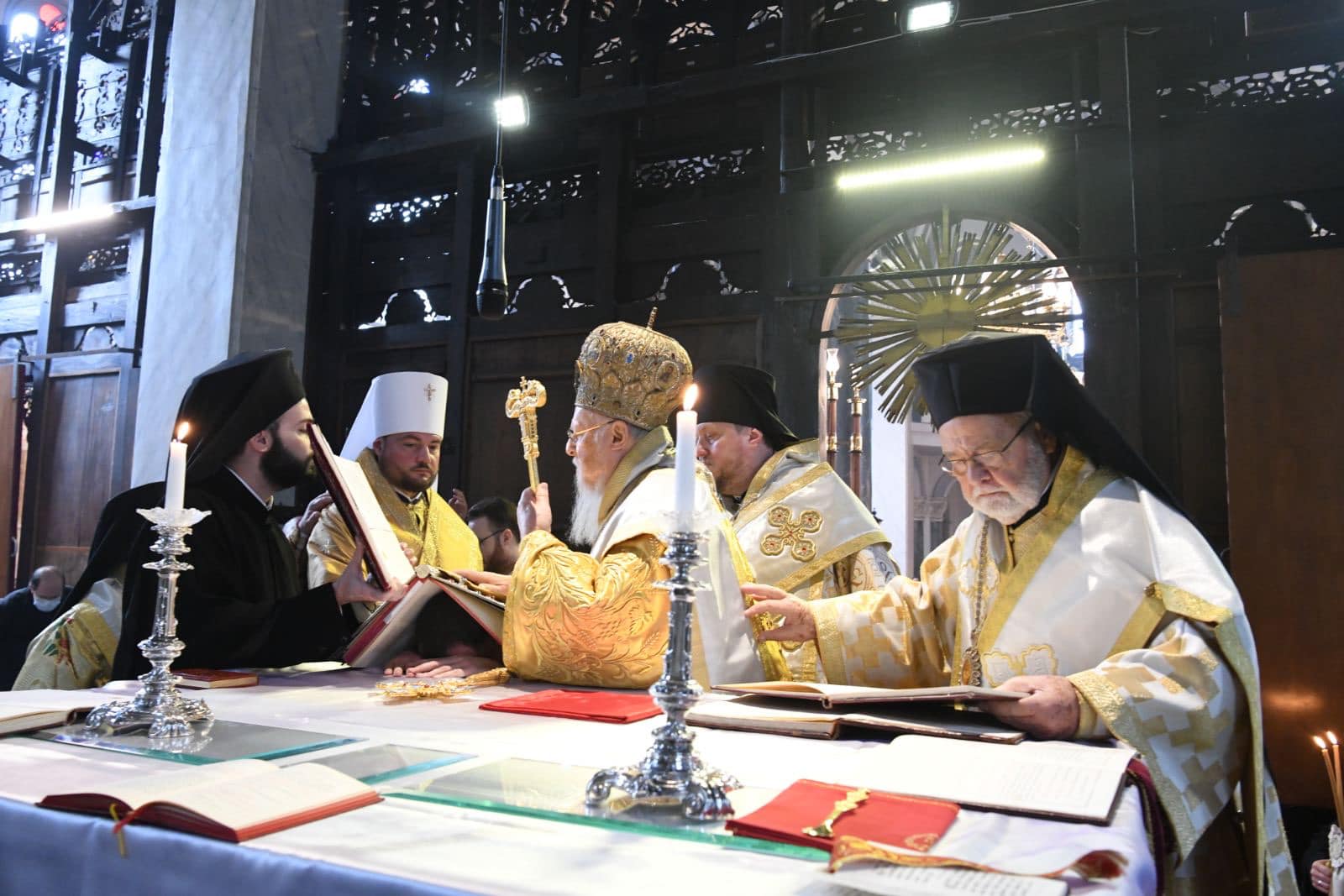“Ordinations” of OCU as an issue for Phanar

On November 8, 2020, Phanar ordained an exarch for Ukraine with the participation of OCU “hierarchs”. How does it show Phanar's attitude towards the OCU “bishops”?
On November 8, 2020, Archimandrite Mikhail (Anishchenko) was ordained Bishop of Koman, Exarch of the Patriarchate of Constantinople in Ukraine at Phanar. A few days earlier, a delegation of the OCU arrived in Istanbul to participate in this event. The delegation was led by the former Metropolitan of the UOC Alexander (Drabinko). It also included “bishop” of the OCU Matthew Shevchuk, former priest of the UOC Viktor Martinenko and “priest” Piotr Landvitovich. The course of the consecration, as well as the events that preceded it, allow us to draw several conclusions that speak about the attitude of Phanar to the OCU in general and to the “consecrations” of Ukrainian schismatics in particular.
OCU – an integral part of the Patriarchate of Constantinople?
At the official level, representatives of the OCU never fail to emphasize that the Phanar-issued Tomos gives their religious structure the same rights that all other Local Orthodox Church have. In other words, it affirms the “independence” and “autocephalousness” of the OCU.
Filaret Denisenko, the “father of the Ukrainian schism” and the main initiator of receiving the Tomos, strongly disagrees with this statement. In his opinion, the Tomos, which Patriarch Bartholomew presented at the “unification council” in January 2018, enshrines the dependence of the newly created religious structure on Phanar. Denisenko stresses that one of the signs of the OCU's dependence on the Phanar is "a ban on us having dioceses and parishes outside of Ukraine". In turn, the Phanariots, speaking about the “autocephalous” status of the OCU, understand it in a completely different sense.
Let's remind that Constantinople claims to the entire Diaspora of the world. That is, it believes that it has the right to provide spiritual guidance to all "barbarian lands", i.e. the entire Orthodox Diaspora "outside the patriarchal and autonomous Churches". In fact, on November 6, 2020, a Phanar representative, addressing the “hierarchs” and “clergy” of the OCU, said that Ukrainians are an integral part of the flock of the Patriarchate of Constantinople: “Ukraine and all co-religionists living in the City (Istanbul – Ed.) are the flock of Constantinople Patriarch. We do not separate you; the Mother Church takes care of this with pastoral love. "
It follows from this statement that Ukraine is viewed by Constantinople as its canonical territory, which is confirmed by the appointment of an exarch to this territory. Exarchate is a separate ecclesiastical district denoting an administrative-territorial unit foreign to the state of a particular patriarch. In turn, the exarch is the viceroy of the patriarch.
Ukraine is viewed by Constantinople as its canonical territory, which is confirmed by the appointment of an exarch to this territory.
In his address to the Bishop of Koman, Patriarch Bartholomew stressed several times that disputing the authority of the Phanar disrupts the unity of Orthodoxy. In his reply, the Exarch of the Patriarch of Constantinople not only expressed his devotion to Phanar, but also clearly outlined the tasks he was entrusted to solve in Ukraine. We quote the most interesting part of it:
“You did me a great honor when you appointed me as your exarch in the Orthodox Church of Ukraine. My shoulders are weak, but the power of Christ is perfected in infirmities. I am now a successor of the great figures of history, great exarchs of Ukraine, but the only thing that connects me with them is shared devotion, unconditional devotion to the Mother Church and my Patriarch. The stavropegic temple of St. Andrew has a double essence: on the one hand, it shows that in Ukraine there were and are many stavropegia of your predecessors, the patriarchal and stavropegic value of which never decreases, for the signature of the Patriarch is the highest guarantee, and on the other hand, it is a confirmation of the timeless stavropegic privilege and your responsibility, which stems from the indisputable historical and church traditions of many centuries and which no one has the right to take away."
What should be noted here? According to the Bishop of Koman, “in Ukraine there were and are many stavropegia of Phanar, the patriarchal and stavropegic value of which never decreases, and which no one has the right to take away”. It is obvious that it is precisely the return of these stavropegia to the jurisdiction of Istanbul that Mikhail (Anishchenko), a native of Ukraine, will be actively engaged in.
Therefore, Patriarch Bartholomew’s appointing his exarch to the territory of our state speaks not only of the interests of Phanar in Ukraine, but of the lack of independence of the OCU. This fact is so obvious that in order to somehow cover it up, the Phanariots decided to invite a delegation from the OCU to participate in the ordination of the Bishop of Koman.
However, in this case too, the Phanar representatives decided to play it safe.
Why precisely Drabinko?
Of the entire modern “episcopate” of the OCU, only two bishops can boast of canonical consecration – the former metropolitans of the UOC Alexander (Drabinko) and Simeon (Shostatsky). And it is no coincidence that it was Drabinko who headed the delegation of the OCU on Phanar.
The question of the validity of the "ordination" of the OCU was raised by the Local Orthodox Churches and individual hierarchs from the very beginning. It was doubts about the "ordinations" performed by Filaret Denisenko (who "ordained" the overwhelming majority of the "episcopate" of the OCU) that were the reason that the Synods of the Romanian, Albanian and Cypriot Churches refused to recognize both the Tomos and Dumenko.
The Synod of the Romanian Orthodox Church appealed to Phanar with a request “to clarify the problem of non-canonical hierarchs and priests who belonged to the former ‘Kyiv Patriarchate’.”
It was doubts about the "ordinations" performed by Filaret Denisenko (who "ordained" the overwhelming majority of the "episcopate" of the OCU) that was the reason that the Synods of the Romanian, Albanian and Cypriot Churches refused to recognize both Tomos and Dumenko.
The Synod of the Albanian Church sounded even more harshly: “How can one, according to oikonomia, recognize these ordinations as having the grace of the Holy Spirit, because all these ordinations (of schismatics – Ed.) were a blasphemy against the Holy Spirit ... It is impossible to retroactively recognize ordinations that were committed by excommunicated and anathematized Filaret Denisenko, whose ordinations are invalid, deprived of the grace and action of the Holy Spirit."
The Synod of the Cypriot Church also questioned the schismatic “sacraments”: “The 2000-year history of both the Cypriot Church and the entire Orthodox Church casts doubt on the possibility of legalizing the sacraments performed by the bishops from whom the rank was removed, who were excommunicated and fell under anathema."
According to the Primate of the Albanian Orthodox Church, Archbishop Anastasios, "from the moment Filaret was excommunicated and anathematized, he could not perform ordinations."
In addition, many clergymen of the Church of Greece expressed their vision of the problem of ordinations of the OCU, according to whose statements “there was no convincing answer regarding the canonically non-existent ‘holy order’ of the new church”.
A similar opinion is shared by the brethren of Mount Athos, who believe that the “episcopal consecration” of Makariy Maletich “cannot be considered valid, as well as the subsequent “ordinations” of other schismatic “bishops”.
And here are the words of the Metropolitan Nikiforos of Kykkos of the Church of Cyprus, spoken by him in 2019 and then repeated several times: “I am convinced that, as the Holy Synod of the Cypriot Church, we cannot recognize the schismatic Epiphaniy, who has no canonical consecration as the canonical Metropolitan of Kyiv and all Ukraine. Moreover, from the point of view of the canons, it is not allowed to have Eucharistic communion with schismatics and non-ordained persons."
It should be emphasized here that the problem of the “consecration” of the OCU representatives is so thorny for World Orthodoxy that, for example, Cypriot hierarchs refuse to concelebrate with their primate, who recognized Dumenko. Thus, Metropolitan Isaiah of Tamassos announced that "he cannot concelebrate with anyone who commemorates Epiphany, since this would mean that he recognizes someone who has not been properly ordained."
But what is most interesting, the legality of the "ordinations" of the overwhelming majority of the OCU was questioned within the OCU itself. In particular, the former hierarch of the UOC, Metropolitan Simeon (Shostatsky), said that he had proposed to Patriarch Bartholomew to re-ordain the “hierarchs” of the OCU, but the Phanar head refused.
The legality of the "ordinations" of the overwhelming majority of the OCU was questioned within the OCU itself.
In addition, ex-Metropolitan of the UOC Alexander (Drabinko) expressed similar thoughts: “Were the sacraments of the UAOC and the Kyiv Patriarchate grace-filled? This is a question of the past; it may concern those who at one time were in these structures. But not me – the hierarch who came to the Orthodox Church of Ukraine from the UOC (MP), whose grace-filled status has never been denied." Earlier, Drabinko stated that if it were not for his "impeccable canonical dignity", then there would be no Tomos at all.
Thus, it is clear that by inviting Metropolitan Alexander (Drabinko), not Epiphany Dumenko or Zoria, to the consecration of Anishchenko, Phanar, thereby, tried to protect itself from possible claims by other Local Churches regarding the canonical status of this ordination. All the more so if in the future it is nevertheless necessary to reconsider the issue of "apostolic succession" among the "bishops" of the OCU.
Did "bishop" Matthew Shevchuk take part in the consecration?
Another member of the OCU delegation in “bishop's” dignity was “bishop” Matthew Shevchuk, who became famous for the fact that in 2016 he claimed that “our mother is not the Church of Constantinople, but our land.” Does this mean that all the previous reasoning regarding the Phanar's attempt to give the canonical status to the ordination of Mikhail (Anishchenko) is incorrect?
No. First, according to the rules of the Orthodox Church, a bishop must be ordained by at least two bishops. This means that the participation of Patriarch Bartholomew and Drabinko would have been enough. However, in the liturgy, during which Anishchenko was ordained, two more bishops of the Patriarchate of Constantinople took part (in addition to Drabinko and Shevchuk) – Metropolitan Chrysostomos (Kalaidzis) of Mirlikia and Metropolitan Theolipt (Fenerlis) of Iconium. So in terms of the required number of participants in the ordination, there can be no claims. Questions arise about what role Matthew Shevchuk played in this event.
The fact is that Shevchuk was the youngest "bishop" among all those present and stood second to the left of Patriarch Bartholomew, while Mikhail (Anishchenko) was placed on the right at the throne, and not in the center, to read the consecration prayer, i.e.as far as possible from Shevchuk. That is why, when the head of Phanar began to read this prayer with the laying on of hands on the head of Anishchenko, “bishop” Matthew Shevchuk played the role of an observer and did not even get into the frame in the photo below. Hands on the head of the exarch were held by Patriarch Bartholomew and ex-Metropolitan of the UOC Alexander Drabinko, and only in the middle of the ordination did the deacon bring Shevchuk to Anishchenko and placed him on the side of the head of Phanar.


In which case, the Phanariots will be able to declare with a "clear conscience" that the consecration was performed by two bishops (Patriarch Bartholomew and Metropolitan Alexander Drabinko), as prescribed by the rules of the Church, while Matthew Shevchuk was "present."
That is why we have the right to assert that the ordiantion of Mikhail (Anishchenko) clearly demonstrated how Phanar actually approaches “consecrations” of representatives of the Ukrainian schism. At best – as dubious.
***
From all the above, we can conclude that the ordination of the Phanar Exarch for Ukraine has clearly demonstrated several significant points.
First, the OCU is wholly and completely dependent on the Patriarchate of Constantinople and does not have the independence it rants about.
Secondly, Phanar has no intention of to giving up its interests in Ukraine and, with the help of the exarch-bishop, will tightly control the activities of the OCU and possibly implement plans to "return" all the stauropegia prescribed in the agreement with Poroshenko.
Thirdly, Phanar realizes the problem of "consecrations" of the OCU representatives and therefore invited the former Metropolitan of the UOC Alexander (Drabinko), whose canonical status is "impeccable”, to the ordination of the Bishop of Koman.
And fourthly, it is quite possible that it is ex-Metropolitan Alexander who will become the one to help Phanar implement its plans in Ukraine in exchange ... In exchange for the highest possible status of the OCU.











